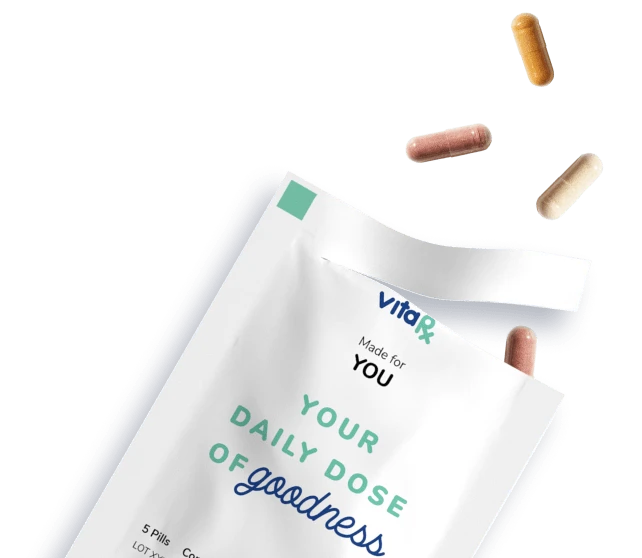Last update: June 1, 2025
8 minute read
What are Adaptogens? Natural Stress Relief, Energy & Immunity
Discover what are adaptogens and how they naturally support stress relief, boost energy, and enhance immune function. Explore our comprehensive guide to top adaptogens for stress, anxiety, and overall well-being.

By Derick Rodriguez, Associate Editor
Edited by Dr. Dimitar Marinov, MD, RDN, PhD

In today's fast-paced world, many wonder, what are adaptogens and how can they help you manage the pressures of everyday life? From boosting energy levels to providing adaptogens and immune support, these natural substances have garnered attention as some of the top adaptogens for stress relief.
Whether you're looking for adaptogens for stress, adaptogens for anxiety, or simply curious about how do adaptogens work, our guide will help you understand these remarkable herbs and discover the most promising adaptogens for energy.
Key takeaways
- Adaptogens are natural substances that help the body adapt to stress and promote balance
- They regulate stress hormones and support the body's stress response system
- Popular adaptogens include ashwagandha, rhodiola, and ginseng
What are adaptogens, and why should you care?
Adaptogens are nature's gift to us in our never-ending battle against stress and fatigue. Adaptogenic herbs have been used for centuries in traditional medicine to help your body maintain balance and adapt to various stressors. But why exactly should you care? Well, let me tell you!
In today's fast-paced world, you're constantly bombarded with stressors that can affect your physical and mental health. This is where adaptogens come in!
What are Adaptogens? Adaptogens are a unique class of plants that support the body's ability to handle stress, regulate cortisol, and maintain overall balance. They work by interacting with the body's stress response systems, promoting resilience and helping you adapt to physical and emotional challenges.
These potent plants, like ashwagandha and rhodiola, have been shown to support cortisol regulation, immunity, and energy levels. They may also improve mental clarity and hormonal balance. With many benefits, it's no wonder adaptogens have become a staple in many wellness routines.

Let's look at a real-life example to back this up. Research on adaptogens suggests that these powerful herbs may enhance physical performance and reduce fatigue among people exposed to high stress levels.
So, whether you're an athlete, have a stressful profession, or just trying to keep up with life's demands, adaptogens might just be the secret ingredient to stay on top of your game.
VitaRx Tip
Adaptogens may help you adapt to physical and emotional challenges—so they're basically your body's BFF in these stressful times!
How do adaptogens work in the body?
Adaptogens uniquely interact with a part of your body's stress response system, also known as the hypothalamic-pituitary-adrenal (HPA) axis. When we experience stress, the stimulus on the adrenals increases, leading to a higher release of cortisol—our primary stress hormone. Adaptogens help regulate this response, ensuring that your cortisol levels remain balanced and reducing the negative effects of stress.
One of the key mechanisms behind adaptogens is their ability to help restore homeostasis or balance in the body. They achieve this by modulating the production and release of various hormones like cortisol and other key mediators of the stress response that work on a cellular level. This helps your body to better adapt to stress and maintain overall well-being.
Let's look at a specific example: ashwagandha, one of the most popular adaptogens out there. Ashwagandha has been shown to reduce cortisol levels and improve stress resilience significantly. This makes it an excellent choice for those seeking adaptogens for anxiety or adaptogens for sleep, as it promotes relaxation and helps the body cope with stress more effectively.
What are the most popular adaptogens?
When it comes to adaptogens, a few superstars have captured the hearts and minds of wellness enthusiasts. These popular adaptogens have been widely researched and are known for their potential benefits in helping the body cope with stress, improve overall well-being, and maintain balance. Let's take a closer look at the top three most popular adaptogens:
- Ashwagandha: Also known as Indian ginseng, ashwagandha has been used in Ayurvedic medicine for centuries. It's known for its ability to help reduce stress, anxiety, and fatigue while supporting cognitive function and promoting relaxation. A study published in the Indian Journal of Psychological Medicine found that ashwagandha was effective in reducing stress and anxiety levels in adults experiencing chronic stress.
- Rhodiola: This Arctic root has a long history of use in traditional medicine for its adaptogenic properties. Rhodiola is believed to help improve mental performance, reduce fatigue, and support a healthy stress response. In a study published in the Journal of Ethnopharmacology, researchers found that rhodiola extract could help reduce mental fatigue and improve cognitive function in people experiencing stress-related burnout.
- Ginseng: Often referred to as the "king of herbs," ginseng is one of the most well-known adaptogens. There are two primary types of ginseng: American ginseng (Panax quinquefolius) and Asian ginseng (Panax ginseng). Both varieties help boost energy, support immune function, and enhance mental clarity. A review published in the Journal of Ginseng Research found that ginseng could potentially help improve physical performance and reduce fatigue in healthy people.
These popular adaptogens are just the tip of the iceberg regarding natural ways to support your body's stress response system. With research continually emerging, it's worth exploring the world of adaptogens to see which resonates with your health and wellness goals.
VitaRx Tip
VitaRx has a variety of adaptogens in stock and ready to ship, including ashwagandha, Rhodiola, and American ginseng.
This table presents the top 5 adaptogenic herbs and their origins.
Rank | Adaptogenic Herb | Origin | Primary Use |
|---|---|---|---|
1 | Ashwagandha | India | Stress relief, energy, vitality |
2 | Rhodiola | Siberia | Stress resistance, physical endurance |
3 | Ginseng | Asia | Energy, stamina, immune support |
4 | Holy Basil | India | Stress relief, immune support |
5 | Cordyceps | China | Energy, stamina, lung health |
Caption: Top 5 Adaptogenic Herbs: Discover their origins and primary uses to enhance your overall well-being and stress response.

Common side effects for adaptogens
While adaptogens are celebrated for their potential benefits, it's important to recognize that, like any supplement, they may cause side effects in some people. Common side effects associated with adaptogens can include:
- Digestive discomfort: Some users may experience stomach upset or gastrointestinal issues.
- Dizziness and dry mouth: Certain adaptogens, such as Rhodiola rosea, may cause mild dizziness or a dry mouth sensation.
- Headaches: In some cases, individuals report headaches, particularly when first introducing adaptogens into their routine.
- Allergic reactions: Although rare, ingredients like goji berry can trigger allergic reactions in sensitive individuals.
- Hormonal interference: Herbs like ashwagandha, while beneficial for reducing stress, may not be suitable for pregnant individuals due to potential hormonal effects.
It's always advisable to consult with a healthcare provider before starting any new supplement regimen, especially if you have pre-existing health conditions or are taking medications.
Other adaptogen sources
Not all adaptogens are created equal—each offers unique benefits tailored to different wellness needs. While popular choices like ashwagandha, rhodiola, and ginseng are well-known, there’s a broader spectrum available.
Here's a comprehensive table with many adaptogens along with their potential benefits:
Adaptogen | Possible benefits |
|---|---|
American Ginseng (Panax quinquefolius) | May boost memory, reaction time, calmness, and support the immune system |
Ashwagandha (Withania somnifera) | May reduce stress and anxiety, offering both energizing and relaxing effects |
Astragalus (Astragalus membranaceus) | May combat fatigue and bolster overall immune function |
Cordyceps (Cordyceps militaris) | May enhance stamina and elevate energy levels |
Goji Berry (Lycium barbarum) | May improve energy, mental performance, calmness, and sleep quality |
Eleuthero Root (Eleutherococcus senticosus) | May enhance focus and ward off mental fatigue |
Jiaogulan (Gynostemma pentaphyllum) | May reduce stress while boosting endurance |
Licorice Root (Glycyrrhiza glabra) | May help reduce oxidative stress |
Rhodiola Rosea (Rhodiola rosea) | May help prevent physical and mental fatigue |
Schisandra Berry (Schisandra chinensis) | May enhance endurance, mental performance, and overall working capacity |
Tulsi / Holy Basil (Ocimum sanctum/tenuiflorum) | May alleviate both physical and mental stress, while improving memory and cognition |
Turmeric (Curcuma longa) | May contribute to reduced symptoms of depression |
Dangshen (Codonopsis pilosula) | Traditionally used to boost vitality and support overall energy balance |
Reishi (Ganoderma lucidum) | May help the body adapt to stress and support healthy sleep patterns |
Maca Root (Lepidium meyenii) | May support memory, mood, and hormonal balance |
Wild Yam (Dioscorea villosa) | May offer antimicrobial, antioxidant, anti-inflammatory, anticancer, and antidiabetic effects |
Bacopa (Bacopa monnieri) | May improve memory, cognition, and support neurological health |
These adaptogens provide a versatile arsenal for people looking for adaptogens for stress and anxiety or aiming to explore the benefits of various herbs for holistic health.
Frequently asked questions (FAQ)
Here are some of the most frequently asked questions about adaptogens.
Final thoughts
In summary, adaptogens offer a natural approach to achieving balance in our busy lives, acting as powerful allies for both adaptogens for stress and adaptogens for anxiety. These remarkable substances provide a holistic way to support your body’s response to daily challenges.
Exploring this diverse group of herbs can pave the way for improved wellness and resilience. Embrace the potential of these natural wonders and take a proactive step toward a healthier, more balanced lifestyle.
Sources
- Effects of Adaptogens on the Central Nervous System and the Molecular Mechanisms Associated with Their Stress—Protective Activity
- A prospective, randomized double-blind, placebo-controlled study of safety and efficacy of a high-concentration full-spectrum extract of ashwagandha root in reducing stress and anxiety in adults
- Monoamine oxidase inhibition by Rhodiola rosea L. roots
- Effect of high-dose ginsenoside complex (UG0712) supplementation on physical performance of healthy adults during a 12-week supervised exercise program: A randomized placebo-controlled clinical trial
Editor

Derick Rodriguez
Derick Rodriguez focuses on editing health and wellness-related content. With over half a decade of experience in the digital realm, Derick has developed a unique skill set that bridges the gap between complex health concepts and accessible, user-friendly communication. His approach is deeply rooted in leveraging personal experiences and insights to illuminate the nuances of health and wellness topics, making them more approachable and empowering readers with knowledge and confidence.
Fact checker

Dr. Dimitar Marinov
Dr. Marinov has years of experience in scientific research and preventive and clinical medicine. His publications in peer-reviewed journals are on nutritional status, physical activity, and musculoskeletal disorders among adolescents.
At VitaRx, we're not just passionate about our work — we take immense pride in it. Our dedicated team of writers diligently follows strict editorial standards, ensuring that every piece of content we publish is accurate, current, and highly valuable. We don't just strive for quality; we aim for excellence.
Related posts
While you're at it, here are some other relevant articles you might be interested in.

Get your personalized vitamin recommendations in less than
5 minutes.
Get your personalized vitamin recommendations in less than
5 minutes.







